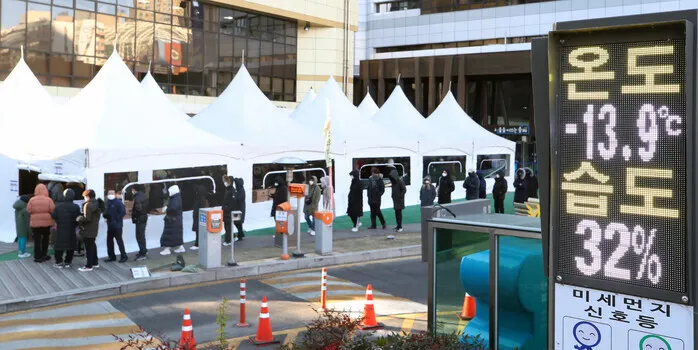hankyoreh
Links to other country sites 다른 나라 사이트 링크
S. Korea tallies 114 new Omicron cases over the weekend

With more people testing positive for the Omicron variant of the COVID-19 virus while the route of infection remains unknown in an increasing number of cases, there is growing concern that Omicron will soon become the dominant viral variant in South Korea.
According to information about Omicron cases provided by Korea’s Central Disease Control Headquarters (CDCH) on Sunday, a total of 376 cases of Omicron have been confirmed in Korea so far. After the first domestic case was identified on Dec. 1, it took 13 days to reach 100 cases (114 on Dec. 13), eight days to double to 200 cases (227 on Dec. 21), and just four more days to reach 300 cases (343 on Dec. 25). A total of 114 people tested positive for Omicron over the weekend.
Omicron’s spread is noticeably faster than that of the Delta variant. It took 26 days (Dec. 1-26) for Omicron to reach 376 cases, compared to 70 days (Apr. 22-June 30) for Delta to do the same. When the CDCH analyzed two Omicron infection clusters in Korea involving 134 cases, they found that 44.7% of carriers went on to infect their family members, which was more than double that of Delta (around 20%).
There are also growing concerns that the variant is spreading at the community level.
There have been a total of 14 cluster infections involving Omicron, with 223 patients infected. Clusters in Geoje, South Gyeongsang Province; at a restaurant in Gangwon Province; and in Iksan, North Jeolla Province (involving a kindergarten in Iksan and daycares in Buan and Jeongeup) are examples of community transmission, with no infections traced to people entering Korea from overseas.
The other 153 people who tested positive for Omicron caught the variant outside of Korea.
Disease control authorities predicted that Omicron could become the dominant strain of the coronavirus in Korea, accounting for more than 50% of cases, within a month or two. During the third week of December (Dec. 12-18), the most recent period for which data is available, Omicron accounted for 2.2% of the total, compared to Delta at 97.8%. But once PCR reagents for rapid testing, which can identify Omicron within three or four hours, are introduced on Dec. 30, the number of confirmed Omicron patients may seek a rapid surge.
A series of studies have found that Omicron makes current vaccines less effective at preventing infection. According to the results of an analysis of 68,489 people infected with Omicron that the UK Health Security Agency released on Thursday, two doses of AstraZeneca’s vaccine and a third dose of either Pfizer or Moderna’s vaccine were 60% effective at preventing symptomatic infection for two to four weeks, but that efficacy eventually decreased to 35% for Pfizer and 45% for Moderna.
The preventive efficacy of three shots of Pfizer’s COVID-19 vaccine was 70% immediately after the booster but then decreased to 45% after 10 weeks. Two shots of a Pfizer vaccine followed by a Moderna booster remained 70-75% effective through the ninth week.
A study published in the scientific journal Nature found that the level of antibodies that can neutralize Omicron are very low even for those who have received two doses of vaccines produced by AstraZeneca, Pfizer or Moderna, or one dose of Johnson & Johnson’s Janssen vaccine.
However, the World Health Organization and other groups have pointed to other studies showing that getting vaccinated activates T-cells that can recognize and attack Omicron and other strains of the COVID-19 virus, which should lower the risk of hospitalization or death.
By Lim Jae-hee, staff reporter
Please direct questions or comments to [english@hani.co.kr]

Editorial・opinion
![[Correspondent’s column] Coupang’s game in Washington follows familiar pattern [Correspondent’s column] Coupang’s game in Washington follows familiar pattern](https://flexible.img.hani.co.kr/flexible/normal/500/300/imgdb/original/2025/1226/8217667391873536.jpg) [Correspondent’s column] Coupang’s game in Washington follows familiar pattern
[Correspondent’s column] Coupang’s game in Washington follows familiar pattern![[Editorial] Coupang’s attempt to hide behind US won’t win back Korean consumers [Editorial] Coupang’s attempt to hide behind US won’t win back Korean consumers](https://flexible.img.hani.co.kr/flexible/normal/500/300/imgdb/original/2025/1226/1817667387971465.jpg) [Editorial] Coupang’s attempt to hide behind US won’t win back Korean consumers
[Editorial] Coupang’s attempt to hide behind US won’t win back Korean consumers- Coupang under fire for possible obstruction of investigation into its customer data leak
- [Editorial] Coupang founder’s contempt for workers, customer security knows no bounds
- [Column] Confessions of a Coupang-holic
- [Editorial] Kim Bom-suk’s arrogance on full display in boycott of Coupang leak hearing
- [Editorial] The facts of Yoon’s insurrection are clear — justice cannot be further delayed
- [Column] Trump destroys government
- [Column] A post-Western world approaches
- [Column] Offshore balancing, or carving out spheres of influence?
Most viewed articles
- 1Korea to trial next-gen train capable of sub-2-hour Seoul-Busan trip starting 2030
- 2Kim Jong-un’s hidden motive in criticizing South Korea’s nuclear submarine push
- 3[Editorial] Coupang’s attempt to hide behind US won’t win back Korean consumers
- 4Coupang under fire for possible obstruction of investigation into its customer data leak
- 5[Correspondent’s column] Coupang’s game in Washington follows familiar pattern
- 6Real-life heroes of “A Taxi Driver” pass away without having reunited
- 7Moon Jae-in renews call for end-of-war declaration, peace treaty on Korean Peninsula
- 8Chang Chun-ha’s family hopes to know truth of his death after 37 years
- 9Chinese money flooding into South Korean companies
- 10Russian architect personally witnessed Empress Myeongseong’s assassination by Japanese ronin, accoun